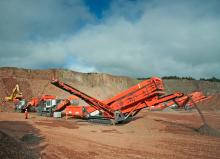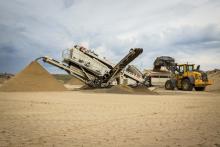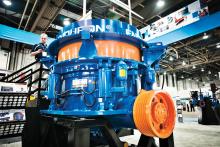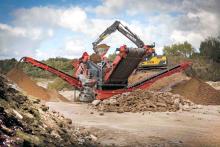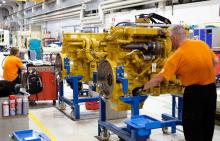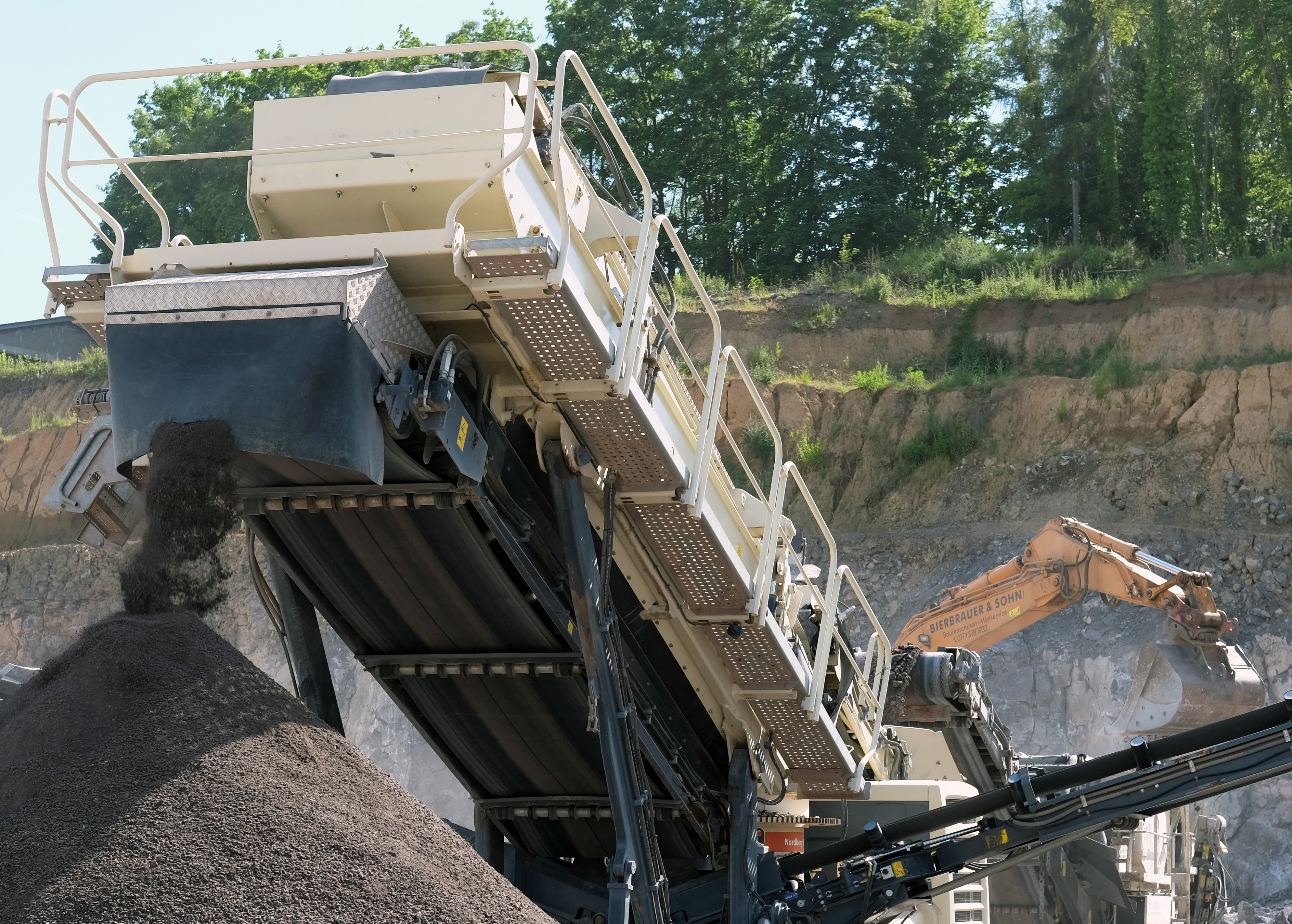
A change from a stationary to mobile processing method is paying dividends for a German quarry. Patrick Smith & Guy Woodford report
German quarry Terratec-Basalt sought to cut production costs by changing its processing method from stationary to mobile.
And
“We estimate that we’ll gain a 25-30% savings by gradually changing our quarry from stationary to mobile. The resulting €1-1.5 per metric ton savings is really significant for us,” says Karl-Werner Bierbrauer, managing director and owner of Terratec-Basalt.
“Our savings are based on cutting out half the transportation of the blasted rock to processing. Instead of bringing rocks to the old top-of-the-hill stationary plant, we only need to transport the materials to the nearby Lokotrack mobile process.”
Started in 1962, A. Caspar Basaltwerk in Ettringen, a Bavarian city west of Munich, is known for its high-quality aggregates, produced from basalt and volcanic lava. The family company was bought in early 2017 by Terratec-Basalt.
“For us, buying the quarry means extending our present business of renting mobile crushing plants and screens and transporting. For the time being, we will run the quarry both stationary and mobile; we hope to be able to close the stationary quarry in two years,” says Bierbrauer.
Today, Bierbrauer & Sohn, a sister company of Terratec-Basalt, leases 12 Lokotracks, the biggest Lokotrack fleet in Germany.
The mobile process includes three track-mounted Metso units: a Lokotrack LT106 jaw plant; an ST2.4 mobile screen, and the LT220D cone plant with a screen, which will crush and screen basalt and lava into valuable macadam with capacities of 150-250tonnes/hour.
Blasted basalt and lava is fed first to the LT106 primary jaw plant that feeds the materials to the ST2.4 screen. The screen separates 80-120mm oversized from 0-80mm sizes that are taken to the LT220D cone-screen plant. The main end products from the LT220D are 0-2mm, 3-8mm and 8-16mm.
The end products are used in various applications in the region, including in road construction and as isolation and base materials at construction sites.
Terratec-Basalt will eventually lower production from the current 300,000tonnes/year to some 150,000tonnes. The hourly capacity with the mobile Lokotrack process will be 150-250tonnes.
“We will concentrate on quality products rather than bulk, and we believe we’ll achieve better profitability with this kind of operating strategy. At the end of the day, the value of accurately classified macadam will be much higher.”
Meanwhile,
The redesigned J-960 offers improved all-round preventative maintenance and serviceability access points, and, at its heart, is a direct-driven Terex 900 x 600mm single toggle jaw chamber.
“Its compact size, excellent mobility and high crushing capacity even at tight settings in recycling and hard rock operations make the J-960 ideal for small to medium-sized operators,” says Terex Finlay.
A number of design features have been in-built improving material flow through increased clearances, improved service access points and all-round maintenance serviceability.
For example, the jaw chamber is fitted with an unblock feature to maximise uptime and has a full hydraulic wedge adjust system for quick and easy on-site adjustment of the jaw CSS, minimising downtime. The redesigned main conveyor with 440mm under jaw clearance minimises restrictions in recycling applications.
The second-generation compact and easily transportable Terex Finlay 684 inclined screen also offers design updates. The conveyor design has been simplified and reconfigured to give rapid on-site deployment, while the screen box from the original machine has been retained, giving three large 4.3m x 1.7m screening decks and a screening area of 21.9m².
All four discharge conveyors are adjustable and hydraulically fold for transport.
The Terex Finlay J-1160 uses the Terex 1000 x 600mm jaw crusher and the hydrostatic drive is said to give the flexibility of variable crushing speeds and the ability to run the chamber in reverse in asphalt recycling applications.
The machine is powered by either a Tier 3 constant speed
The 5m³ hopper has fixed sides as standard and is also available with hopper extensions fitted with hydraulic self-locking to provide faster machine set-up and tear-down times.
A key design feature is the 900mm-wide main conveyor which can be raised and lowered allowing the operator to perform maintenance functions from ground level and for ease of removal in clearing blockages.
The R3e is said to offer 20% more productivity than the R3, and claims to offer a near 30% reduction in fuel costs than the R3 when run in diesel-electric drive mode, rising to around 70% if the model is fully powered off mains electricity.
Featuring a new design, the R3e and redesigned R3, which is said to offer the same 20% productivity gains as the R3e, are said to offer fast loading and short set-up times on site, and are powered by a 235kW EU Stage 4
The R3e’s and R3’s new optional single-deck after-screening unit offers almost 4.4m², corresponding to around 30% more screening area than the previous model.
The Bristol and Avon Group (B&A Group) is the first major transport and waste management company to receive the new
Supplied by Blue Machinery (Southern) it has been working at the company’s new aggregate facility at Hallen, near Bristol, South West England.
Recently the group invested more than £7million (€8 million) in a new state-of-the-art 4.45 hectare recycling facility, with a further 4.45 hectares ready to develop in line with the group’s expansion plans.
The new Powerscreen Premiertrak R400X replaces a three-year old Powerscreen R400 jaw crusher.
“We have had good service from our Powerscreen equipment which has provided us excellent availability, production and performance,” says Kevin Bogira, group fleet engineer for B&A Group.
“It made sense at this time to upgrade and take advantage of the new developments of the new Powerscreen Premiertrak R400X. Blue Machinery (Southern) supplied a new machine and we were up and running on our new site in no time.”
Material is delivered to the aggregates processing area by a fleet of B&A Group trucks where the new machine processes the incoming feed of construction and demolition (C&D) recyclable materials which consist mainly of concrete, brick rubble and tarmac. All materials are then pre-prepared before being fed into the Powerscreen Premiertrak R400X to make the required recycled products.
Capable of some 400tonnes/hour, the new machine incorporates a hydraulic release jaw; hydraulic jaw flipper plate; a magnet and side fines conveyor.
It is controlled remotely by umbilical connection and features the Powerscreen Pulse Telematics System, which is available online anywhere and at any time.
The system provides comprehensive information, including the GPS location; start and stop times; fuel consumption; tonnages; cone settings; wear ratings; operating hours, and maintenance status.
It is available on the Sandvik QE341, QA441 and QA451 Doublescreen.
The company says that further developments to its mobile screening and scalping range will be introduced throughout this year, and that continual work is being done to all products to ensure compliancy with the latest emissions regulations by the end of 2018.
“Our new hybrid option has been designed to allow the end user to operate the machine either diesel-hydraulically or electric-hydraulically by plugging in to an external three-phase electric supply,” says the company.
“The unit can also be connected to a separate generator on an upstream crusher when working in a train. There are numerous benefits of using an electrical energy supply. There is of course a substantial saving on fuel and operating costs. Maintenance costs are lowered due to reduced refuelling and no engine servicing, which thereby increases uptime. These are in addition to the environmental advantages.”
All machine operations are carried out using a control station for both modes of operation.

